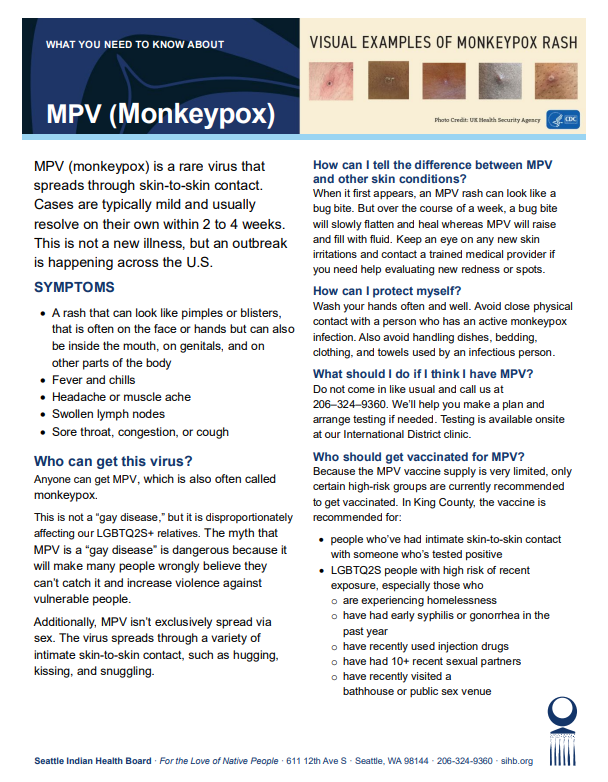
MPV, which is also known as monkeypox, is a rare virus that spreads through skin-to-skin contact. Cases are typically mild and usually resolve on their own within two to four weeks. This is not a new illness, but an outbreak is happening across North America.
We offer MPV testing, vaccines, and treatments. Read on for answers to commonly asked questions.
For a general overview of need-to-know information, check out our printable guide. 🠒
What are the symptoms of MPV?
MPV symptoms include
- A rash that can look like pimples or blisters, often on the face or hands, but can also be inside the mouth, on genitals and other parts of the body
- Fever and chills
- Headache or muscle ache
- Swollen lymph nodes
- Sore throat, congestion, or cough
How can I tell MPV apart from other skin irritations?
When it first appears, an MPV rash can look like a bug bite. But over the course of a week, a bug bite will slowly flatten and heal where MPV will rise and fill with fluid. Keep an eye on any new skin irritations and contact a trained medical provider if you need help evaluating new redness or spots.
Who can get MPV?
Anyone can get MPV.
This is not a “gay disease,” but it is disproportionately affecting our LGBTQ2S+ relatives. The myth that MPV is a “gay disease” is dangerous because it will make many people wrongly believe they can’t catch it and increase violence against vulnerable people.
How does MPV spread?
MPV primarily spreads through a variety of intimate skin-to-skin contact, including but not limited to hugging, snuggling, kissing, and sex. It can also spread when someone touches dishes, bedding, clothing or towels used by a person with an active infection.
Who is eligible for the MPV vaccine at SIHB?
We offer MPV vaccination at our International District Clinic. Because the MPV vaccine supply is very limited, only certain high-risk groups are currently recommended to get vaccinated. At our clinic, the vaccine is recommended for the following groups identified by the Washington State Department of Health:
- Gay and bisexual men and transgender individuals who have had multiple or anonymous gay, male bisexual, or transgender sex partners in the last 3 months.
- People who have used methamphetamine in the last 3 months.
- People who have exchanged sex for money, drugs, or other purposes in the past 3 months.
- People who have been sexually assaulted, regardless of gender or sexual orientation.
- People who have had sexual contact or prolonged skin-to-skin exposure with people who were exposed to MPV.
- People who are known contacts of a person with MPV identified by public health, as well as presumed contacts who either report that a sex partner in the past 14 days was diagnosed with MPV, or who report multiple sex partners in the past 14 days in a area with known MPV.
I’m concerned I might have MPV. How can I get tested?
We offer MPV testing at our clinics. Anyone is welcome to call (206) 324–9360 and schedule an appointment for testing.
I’ve tested positive for MPV. How can I get treatment?
If you are experiencing any of the MPV symptoms above, call (206) 324–9360 and leave a message with your number. A nurse will return your call and ask some questions to assess eligibility, answer your questions, and schedule an appointment for treatment.